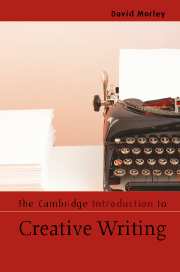Book contents
- Frontmatter
- Contents
- Preface
- Acknowledgements
- Chapter 1 Introducing creative writing
- Chapter 2 Creative writing in the world
- Chapter 3 Challenges of creative writing
- Chapter 4 Composition and creative writing
- Chapter 5 Processes of creative writing
- Chapter 6 The practice of fiction
- Chapter 7 Creative nonfiction
- Chapter 8 Writing poetry
- Chapter 9 Performing writing
- Chapter 10 Writing in the community and academy
- Illustrative bibliography
- Index
Chapter 5 - Processes of creative writing
Published online by Cambridge University Press: 05 June 2012
- Frontmatter
- Contents
- Preface
- Acknowledgements
- Chapter 1 Introducing creative writing
- Chapter 2 Creative writing in the world
- Chapter 3 Challenges of creative writing
- Chapter 4 Composition and creative writing
- Chapter 5 Processes of creative writing
- Chapter 6 The practice of fiction
- Chapter 7 Creative nonfiction
- Chapter 8 Writing poetry
- Chapter 9 Performing writing
- Chapter 10 Writing in the community and academy
- Illustrative bibliography
- Index
Summary
As to the poetical character … it is not itself – it has no self – it is every thing and nothing – It has no character – it enjoys light and shade; it lives in gusto, be it foul or fair, high or low, rich or poor, mean or elevated – It has as much delight in conceiving an Iago as an Imogen … A poet is the most unpoetical of any thing in existence, because he has no Identity – he is continually in for and filling some other Body – The Sun, the Moon, the Sea and Men and Women, who are creatures of impulse, are poetical, and have about them an unchangeable attribute; the poet has none … If then he has no self, and if I am a Poet, where is the Wonder that I should say I would write no more?
john keats, Letter to Richard Woodhouse (Allen, 1948: 44)Focus a clear eye on yourself to ensure you plant the natural stages of the writing process into your daily discipline. Creative writing courses mimic these stages, especially long-term or residential courses where the focus is solely on writing, and you are not studying other subjects. If you are not on such a course formally, then you must try to make your life imitate one, but one of your own devising. Your life is a course to which writing lends cause.
- Type
- Chapter
- Information
- The Cambridge Introduction to Creative Writing , pp. 125 - 154Publisher: Cambridge University PressPrint publication year: 2007



